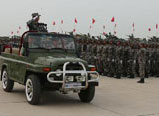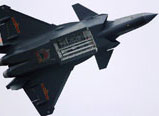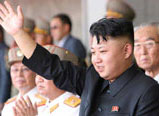
JERUSALEM, July 28 (Xinhua) -- The Israeli government on Sunday approved the release of 104 Palestinian prisoners, thus clearing the way for continued preparatory peace talks.
The release of the prisoners, many of whom are serving life sentences for killing Israelis, are part of the efforts spearheaded by United States Secretary of State John Kerry to restart the peace process. And in doing so Kerry had to find a way to deal with each side's preconditions.
"It has some emotional implications and you have to overcome the reservations of families and relatives, who are backed up by some right-wing politicians. But by enlarge it doesn't really address any of the terms of reference of the negotiations, so Netanyahu doesn't have to deal with that immediately," Dr. Mark Heller of Tel Aviv University told Xinhua on Sunday.
While the release of the prisoners will be tough on the families of their victims, compared to the other demands put forward by Palestinian President Mahmoud Abbas, it will have very limited political implications for Israeli Prime Minister Benjamin Netanyahu.
In addition to the prisoners, who were incarcerated before the peace talks began in 1993, Abbas demanded that Israel agree to the borders between Israel and the Jordanian control West Bank prior to the 1967 War will be basis for the borders of a future Palestinian state. And Israel imposes again a settlement construction freeze as it did in 2009-2010 on behest of U.S. President Barack Obama. NO THREAT TO GOVERNMENT POLICY
Israel has in the past released Palestinian prisoners in exchange for the return of Israeli soldiers, in the most recent example the return of Israeli soldier Gilad Shalit in 2011, Israel releases 1,027 prisoners, so of the three demands made by Abbas this is the least controversial for Israel.
The other two especially the insistence on the 1967 borders would force Netanyahu to do something he has never done before, which is to outline Israel's potential borders with a future Palestinian state.
Prof. Gabriel Ben-Dor of the University of Haifa said about the prisoner release that "this precondition isn't dangerous from the ideological point of view, the other preconditions negotiations on the basis of 1967 boundaries and freezing the settlements would underline the ideological coherence of the ruling party and its main coalition partners from the right."
He added that "this particular move, the prisoner release, has emotional implications and symbolic implications but it will not undermine the ideological foundations of government policy and I think this is why the prime minister chooses this in contradiction to the other two possibilities."
Whereas Netanyahu opposes the 1967 border based on concerns over national security, he argues that if Israel is forced to leave the Jordan Valley in the north-eastern West Bank Israel it would lose its control of the borders of West Bank and Palestinian groups could smuggle in rockets that would target Jerusalem and central Israel.
For Netanyahu's coalition partners, especially Naftali Bennett from the HaBayit HaYehudi party, the 1967 border is a question of ideology.
HaBayit HaYehudi, which means the Jewish home, is a partnership between two right-wing parties with a very strong support among settlers on the West Bank and Bennett has stated that if Netanyahu even begins to talk about handing over land and settlements under Israeli control to the Palestinians, he would leave the government which would cause it to fall.
It should be noted that Abbas' insistence on the 1967 lines isn 't only out of sync with the Israeli position, as in the two previous peace deals offered by Israel to the Palestinians has included a land swap to maintain the main settlement blocks located close to the 1967 line within Israel.
But also with that of some of his strongest supporters such as the Arab League, whose foreign ministers after a meeting with Kerry in February issued a statement saying that they support the idea of land swaps along the 67 borders. FIRST AND LAST?
When Israel implemented the freeze on settlement construction for ten months in 2009-2010 it did so after Obama pressured Israel to do after he first came into office and tried to create a period of calm that would allow the Israelis and the Palestinians to resume the negotiations.
So Netanyahu has shown that he can be pragmatic on the issue and the decision to release the prisoners might be the first and last of Abbas' demands that Israel is going to meet.
















 Working under 40 degrees Celsius
Working under 40 degrees Celsius


![]()
